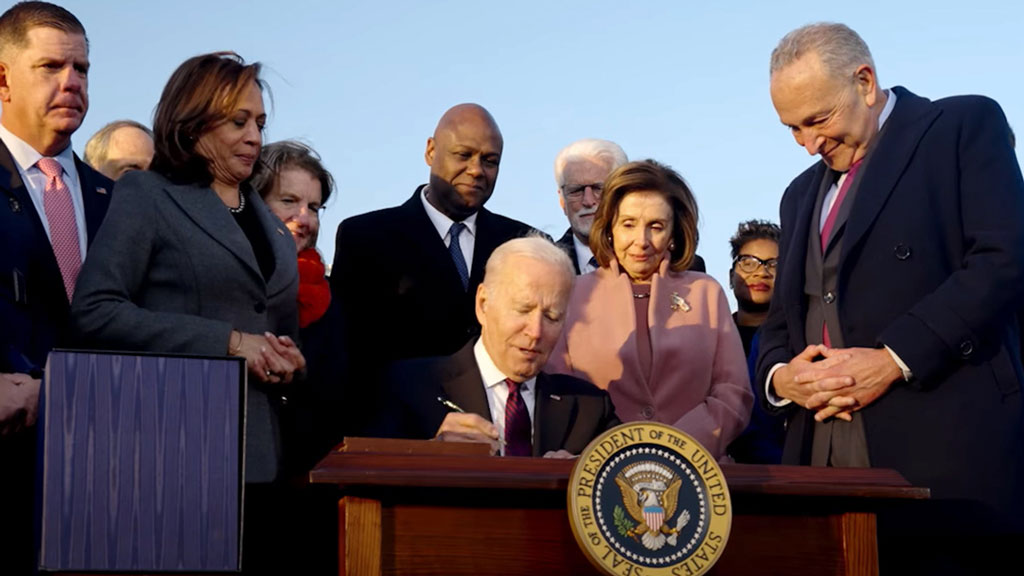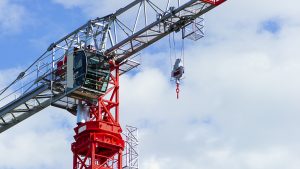U.S. contractors and trade unions alike celebrated when President Joe Biden signed the bipartisan Infrastructure and Jobs Act last month but it’s a different story with the Build Back Better Act (BBBA).
The $1.2-trillion bipartisan bill signed by Biden Nov. 15 will deliver $550 billion on a broad range of infrastructure over five years.
The Associated General Contractors of America (AGC) joined the North America’s Building Trades Unions (NABTU), the International Brotherhood of Electrical Workers (IBEW), the United Brotherhood of Carpenters and Joiners of America (UBC), the Laborers’ International Union of North America (LIUNA) and other stakeholders in hailing what an IBEW statement called a “once-in-a-generation investment in infrastructure.”
Meanwhile, trade unions are aligned in supporting the BBBA, which received House approval Nov. 19 and rests in the Senate, but the AGC is steadfast in opposition.
AGC vice-president of public affairs Brian Turmail called with BBBA “very partisan, and very dangerous.”
“We have real concern with the Build Back Better plan. It has an enormous amount of new labour and environmental rules that would really undermine the investments that are in the infrastructure bill.”
The $1.75-trillion BBBA contains significant spending on social and climate goals including $320 billion in tax credits to support clean energy manufacturing. There is also a host of pro-worker measures such as radical reform of the National Labor Relations Act and provisions to severely increase civil penalties for violations of the Fair Labor Standards Act and the Occupational Safety and Health Act.
Other measures would boost family leave and health care and reform immigration laws.
“The act is the largest rewrite of U.S. labour laws in over 60 years and something that we feel would really undermine the broader economy by essentially weaponizing strikes so that unions could call them at a moment’s notice and disrupt large parts of economic activities to help them at the negotiating table,” said Turmail.
“We think that it would undermine the broader case for infrastructure by putting a lot of things on the label of infrastructure that have nothing to do with infrastructure, including a green jobs corps.”
A statement from the IBEW on the BBBA noted the focus on child care and home care for the elderly and said, “This legislation would also hold accountable employers who create unsafe and hazardous work environments, or refuse to pay their workers what they are owed.”
NABTU president Sean McGarvey issued a statement pledging to work with Democrats in the Senate to get the bill passed and signed by the president by the end of December.
“This historic investment will take unprecedented steps forward by creating middle-class jobs in the renewable energy sector, increasing labour protections and penalties for low-road contractors and offering working families more access to pre-apprenticeship programs, affordable child care, early childhood education programs and elder care,” stated McGarvey.
The legal website JD Supra suggested passage of the BBBA is uncertain, saying, “It appears likely there will be changes to the bill before the Senate votes on it.”
Turmail also noted the spending would be inflationary and said, “Its fate in the Senate is far from clear.”
AGC analysis of the bipartisan infrastructure bill highlighted spending on a broad range of types of infrastructure, from roads, bridges, transit systems and passenger rail to “forgotten infrastructure” such as water and wastewater systems, waterways, locks and dams.
The legislation provides for a $65-billion investment in broadband; $17 billion in port infrastructure and $25 billion in airports including electrification; and $7.5 billion for zero- and low-emission buses and ferries.
Billions in spending were eliminated from earlier versions of the infrastructure bill but Turmail said none of his members are complaining given the major economic stimulus the package represents.
“This is probably the best possible outcome,” said Turmail. “No one should compare these with some of the fantasy numbers that were being kicked around before.”
Carpenters general president Douglas McCarron called the bipartisan bill “historic.”
“By passing the infrastructure bill first, state and local governments can begin the process of allocating that money and contractors can prepare to bid those projects. At the same time, Congress can get back to work to support the other priorities of American workers, like affordable child care and affordable medical care,” said McCarron.
LIUNA general president Terry O’Sullivan was at the White House for the Nov. 15 signing ceremony and later said, “The investment will put labourers to work in every community, revitalize our nation’s economy, and open doors to the middle-class for hundreds of thousands of working men and women.”
Follow the author @DonWall_DCN.










Recent Comments
comments for this post are closed